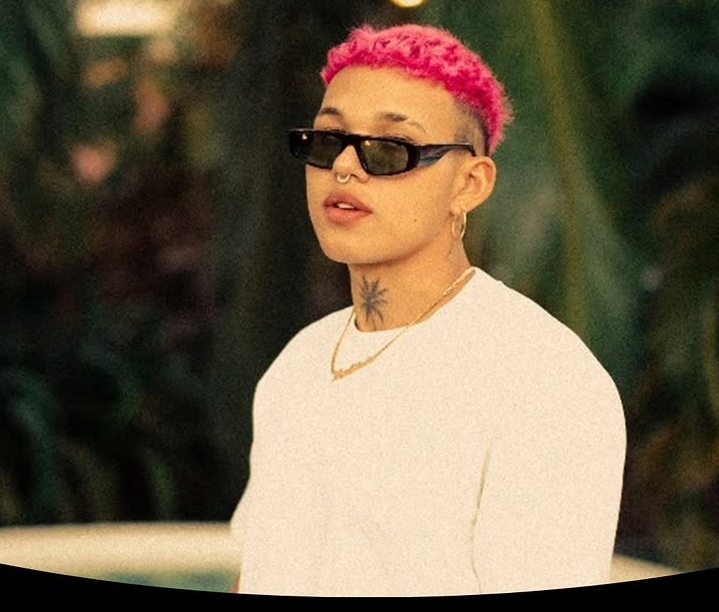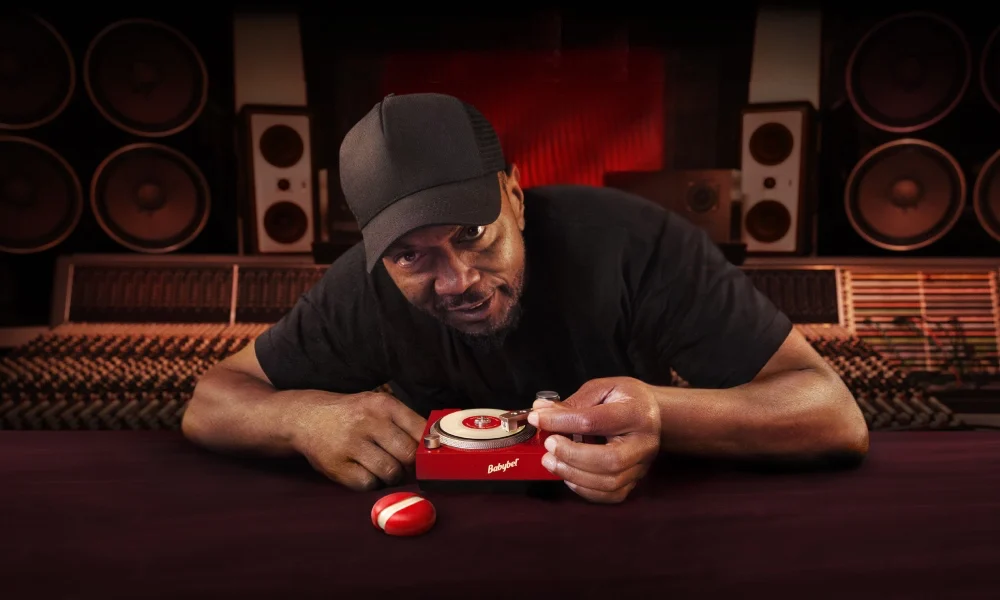A 26-track debut blending reggaetón, Afrobeats, coastal rhythms, and a prayer in English
Beéle didn’t just arrive—he erupted. With borondo, his debut album clocking in at 26 tracks deep, he isn’t asking for attention; he’s commanding it. This is the sound of an artist kicking down the genre gates, setting fire to the rulebook, and throwing a beach party on the ashes.
If you’ve been anywhere near Latin pop’s forward edge, you’ve heard his name. If not, you’ve definitely heard “Mi Refe,” the viral smash that netted triple-Platinum certifications and dominated the Latin Spotify Global Chart. But borondo goes way beyond the hit. It’s a full-body declaration: Beéle is here to rewrite the blueprint.
And he’s doing it with swagger, skill, and that unmistakable swing that only comes from the Caribbean coast.
THE COAST IN HIS BLOOD
Born Brandon De Jesús López Orozco in Barranquilla, Colombia, Beéle grew up in a melting pot of sound. The city pulses with champeta, salsa, reggae, vallenato, and a deep Afro-Colombian heritage. That sonic stew seeps into borondo at every turn. You can hear it in the drums. In the cadence. In the rhythm that snakes between verses.
Where most artists build up to an album this ambitious, Beéle launched with it. He called in heavy hitters—Marc Anthony on “Quédate,” Myke Towers on “Colmillo,” and Blessd on “Por Dentro.” But make no mistake: this is Beéle’s world. The guests are just visiting.
What he’s offering isn’t just a collection of songs—it’s a mapped-out cultural journey. It moves through moods and tempos with the ease of someone who’s spent years studying how people move, dance, and feel.
26 TRACKS. NO SKIPS.
Let’s talk scope. borondo doesn’t play safe. Where other albums trim the fat at 10 or 12 tracks, Beéle delivers a buffet. It’s sprawling, yes—but it’s also cohesive. There’s no filler here, just phases of a bigger vision.
From the percussive, dancehall-tinged opener to the stripped-down ballads tucked deep in the second half, the pacing feels intentional. Tracks like “Sigue” and “Ojitos” offer breezy reggaetón love songs with a soft touch, while “Demasiado Brutal” leans into his pop instincts with slick production and clean hooks. Then there’s “Pa Que Sepa,” which flips the tempo and throws in a traditional tambora rhythm like a flex—just because he can.
There’s also a moment on “Lost in the Middle” where Beéle switches to English. It’s not a gimmick. It’s a prayer. Literally. A moment of spiritual clarity in the middle of a dance-heavy album. And it lands. Hard.
NOT YOUR TYPICAL URBAN STAR
Beéle’s not cut from the same cloth as the trap-heavy Latin stars dominating playlists. His approach is more textured. He’s not trying to be bad bunny or Rauw Alejandro. He’s not chasing the dark, auto-tuned edge or the flashy flex culture. His version of urban music has heart. It has melody. It lets you dance and feel something at the same time.
That doesn’t mean he’s soft. His pen cuts deep. On “La Última,” he talks heartbreak with rawness, never veering into melodrama. On “El Lado Malo,” he offers a twist—what if he’s the problem? It’s the kind of emotional intelligence you don’t always expect in club-ready records.
And then there’s “Rulay.” A clear standout, the track blends Afrobeat rhythms with dembow flair and a whispered chorus that somehow gets louder in your head with every listen. It’s experimental, but it works.
A NEW KIND OF GLOBAL LATIN STAR
The rise of Latin music has exploded over the past decade, but Beéle represents a different strain of that success. He’s part of a wave that’s less about crossover hits and more about global connect. He doesn’t need to “Americanize” his sound to reach more people. Instead, he brings the global to him.
Afrobeats. Soca. Bossa nova. Reggae. It’s all part of the ecosystem he’s building. In interviews, Beéle has spoken about music as vibration—as energy. That shows up in his delivery. He’s not just singing lyrics. He’s transmitting frequencies. And listeners feel it.
The Heat Latin Music Awards are catching on. With seven nominations this year—including Best New Artist, Best Album, and Song of the Year—he’s not just being seen. He’s being taken seriously.
CULTURE FIRST. THEN COMMERCE.
In an industry that often asks young stars to trade authenticity for access, Beéle’s keeping his roots front and center. The title borondo isn’t just a name—it’s a colloquial word from Colombia’s coast, meaning a stroll, a cruise, a meandering adventure. That’s the point of the album. It’s a wander. Through love. Through place. Through sound.
It’s not about neat marketing packages. It’s not about the algorithm. It’s about taking your time, vibing out, and letting the music take you somewhere.
Even the visuals stick to that ethos. The cover art is sun-baked, unfiltered, and beach-worn—mirroring the album’s sonic textures. Beéle isn’t polished to a synthetic sheen. He’s textured. Like sand on skin. Like salt in the air.
A SONIC REVOLUTION WITH A SOFT TOUCH
The genius of borondo lies in its layering. At first, you hear the beats—danceable, crisp, tropical. But on deeper listens, the subtleties emerge. Beéle’s use of harmonies. The emotional elasticity in his voice. The way a track will drop to silence for half a second before bursting into chorus. These aren’t accidents. They’re the moves of someone who’s spent time in the studio, experimenting, feeling things out—not just chasing hits.
That sensitivity pays off. Fans aren’t just hearing bangers. They’re forming attachments.
FROM LOCAL LEGEND TO WORLD STAGE
This isn’t the kind of album you make on a whim. It’s the product of time, of cultural grounding, of a clear artistic compass. Beéle isn’t making music to fit in. He’s setting his own coordinates.
And the industry’s watching. After the Spotify wins and award nominations, the pressure to follow up could have pushed him toward safer choices. Instead, he delivered 26 tracks that refuse to settle. Each song is a flag staked in a different part of the musical map.
Beéle didn’t just blow the roof off genre lines. He left the building, took the roof with him, and threw a party in the sky.
FINAL TAKE
Beéle’s borondo isn’t just an album—it’s a watershed moment for Latin music’s next generation. It’s proof that you don’t have to follow trends to dominate charts. You don’t have to sacrifice emotion for a hit. And you definitely don’t have to sound like anyone else to be undeniable.
At 26 tracks, it’s bold. At its core, it’s intimate. And by the end, it’s clear: Beéle isn’t just crossing genre lines—he’s redrawing the map.
Whether he’s whispering over Afrobeats, crooning in coastal Spanish, or praying in English, one thing’s certain—he’s not going anywhere.
This is his borondo. And we’re all just lucky to be along for the ride.
TRACK HIGHLIGHTS:
- “Mi Refe” – The global smash that put him on the map
- “Quédate” (feat. Marc Anthony) – Salsa-pop magic with a master
- “Rulay” – Afrobeat-meets-dembow anthem
- “Lost in the Middle” – English-language prayer, a bold pivot
- “Por Dentro” (feat. Blessd) – Melancholy meets swagger
- “El Lado Malo” – Relationship introspection with teeth
Awards Watch: 7 Nominations at the Heat Latin Music Awards
Genre DNA: Reggaetón, Afrobeats, Caribbean pop, Afro-Colombian rhythms
Cultural Origin: Barranquilla, Colombia
Big Picture: borondo just reset the bar. Beéle’s not waiting for a lane. He’s making one.
No comments yet.







